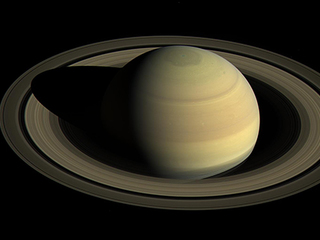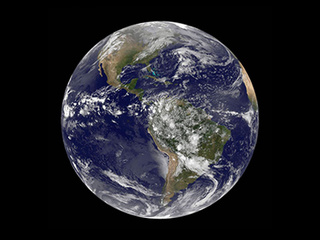SIZE COMPARISON
Saturn
Earth
Saturn is 9.1x larger than Earth
DATE OF DISCOVERY
Date object was discovered
Unknown
Unknown
DISCOVERED BY
Name of discoverer(s)
Known by the Ancients
Known by the Ancients
AVERAGE ORBIT DISTANCE
Average of minimum and maximum distances from an object to the body it orbits.
1,426,666,422km
886,489,415miles
1.4266664 x 109km
149,598,262km
92,956,050miles
1.4959826 x 108km
MEAN ORBIT VELOCITY
The average speed of an object over an entire orbit.
34,701km/h
21,562mph
9.6391 x 103m/s
107,218km/h
66,622mph
2.9783 x 104m/s
ORBIT ECCENTRICITY
The amount an object's orbit deviates from a perfect circle.
0.05386179
0.01671123
EQUATORIAL INCLINATION
The tilt of an objects equator in relation to the plane of the ecliptic.
26.7 degrees
23.4393 degrees
EQUATORIAL RADIUS
The distance from the center of an object to its equator.
58,232km
36,183.7miles
5.8232 x 104km
6,371.00km
3,958.8miles
6.3710 x 103km
EQUATORIAL CIRCUMFERENCE
The distance around an object at the equator.
365,882.4km
227,348.8miles
3.65882 x 105km
40,030.2km
24,873.6miles
4.00302 x 104km
VOLUME
The amount of space an object occupies.
827,129,915,150,897km3
198,439,019,647,006miles3
8.2713 x 1014km3
1,083,206,916,846km3
259,875,159,532miles3
1.08321 x 1012km3
SURFACE AREA
The outer or uppermost part of a planet, moon, asteroid, comet or other body.
42,612,133,285km2
16,452,636,641square miles
4.2612 x 1010km2
510,064,472km2
196,936,994square miles
5.1006 x 108km2
ESCAPE VELOCITY
The speed needed for an object to break away from the gravitational pull of a planet or moon.
129,924km/h
80,731mph
3.609 x 104m/s
40,284km/h
25,031mph
1.119 x 104m/s
ATMOSPHERIC CONSTITUENTS
The major gases surrounding a planet in layers.
Hydrogen, Helium
Hydrogen, Helium
H2, He
Nitrogen, Oxygen
Nitrogen, Oxygen
N2, O2
Page Updated: May 16, 2024


